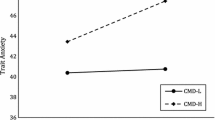Abstract
The present study examined the relationship between perfectionism and various features of anxiety to determine whether these features of anxiety were related to perfectionism independent of depression. A factor analysis of various measures of anxiety symptoms reduced the measures to three factors: obsessive-compulsive disorder, social anxiety/trait anxiety/worry, and posttraumatic stress disorder (PTSD) symptoms. All three factors were significantly related to maladaptive perfectionism, but the social/trait/worry factor was the only factor found to be related to maladaptive perfectionism independent of depression. The PTSD factor was the only factor related to the adaptive component of perfectionism, and this relationship remained significant even after controlling for depression. Perfectionism was related to depression after controlling for the three anxiety factors; maladaptive perfectionism was positively related to depression and adaptive perfectionism was negatively related to depression. These findings indicate that there appears to be an aspect of perfectionism that is related to anxiety independent of depression and a separate aspect of perfectionism that is related to depression independent of anxiety.
Similar content being viewed by others
REFERENCES
Antony, M. M., Purdon, C., Huta, V., & Swinson, R. (1998). Dimensions of perfectionism across the anxiety disorders. Behaviour Research and Therapy, 36, 1143–1154.
Beck, A. T., Rush, A. J., Shaw, B. F., & Emery, G. (1979). Cognitive therapy for depression. New York: Guilford Press.
Beck, A. T., & Steer, R. A. (1987). Beck Depression Inventory manual. San Antonio, TX: Psychological Corp.
Bieling, P. J., Antony, M. M., & Swinson, R. P. (1998). The State-Trait Anxiety Inventory: Structure and content re-examined. Behaviour Research and Therapy, 36,777–788.
Blankstein, K. R., Flett, G. L., Hewitt, P. L., & Eng, A. (1993). Dimensions of perfectionism and irrational fears: An examination with the Fear Survey Schedule. Personality and Individual Differences, 15, 323–328.
Burns, G. L., Keortge, S. G., Formea, G. M., & Sternberger, L. E. (1996). Revision of the Padua Inventory of obsessive-compulsive symptoms: Distinctions between worry, obsessions, and compulsions. Behaviour Research and Therapy, 34, 163–173.
Enns, M. W., & Cox, B. J. (1999). Perfectionism and depression: Symptom severity in major depressive disorder. Behaviour Research and Therapy, 37, 783–794.
Flett, G. L., Hewitt, P. L., Endler, N. S., & Tassone, C. (1995). Perfectionism and components of state and trait anxiety. Current Psychology: Developmental-Learning Personality-Social, 13, 326–350.
Frost, R. O., Heimberg, R., Holt, C., Mattia, J., & Neubauer, A. (1993). A comparison of two measures of perfectionism. Personality and Individual Differences, 14, 119–126.
Frost, R. O., Marten, P., Lahart, C., & Rosenblate, R. (1990). The dimensions of perfectionism. Cognitive Therapy and Research, 14,449–468.
Frost, R. O., & Steketee, G. (1997). Perfectionism in obsessive-compulsive disorder. Behaviour Research and Therapy, 35, 683–692.
Hewitt, P. L., & Flett, G. L. (1991). Perfectionism in the self and social contexts: Conceptualization, assessment, and association with psychopathology. Journal of Personality and Social Psychology, 60, 456–470.
Juster, H. R., Heimberg, R. G., Frost, R. O., Holt, C. S., Mattia, J. I., & Faccenda, K. (1996). Social phobia and perfectionism. Personality and Individual Differences, 21, 403–410.
Leary, M. R. (1983). A brief version of the fear of negative evaluation scale. Personality and Social Psychology Bulletin, 9, 371–375.
Metzger, R. L. (1976). A reliability and validity study of the State-Trait Anxiety Inventory. Journal of Clinical Psychology, 32, 276–278.
Meyer, T. J., Miller, M. L., Metzger, R. L., & Borkovec, T. D. (1990). Development and validation of the Penn State Worry Questionnaire. Behaviour Research and Therapy, 28, 487–495.
Minarek, M. L., & Ahrens, A. H. (1996). Relations of eating behavior and symptoms of depression and anxiety to the dimensions of perfectionism among undergraduate women. Cognitive Therapy and Research, 20, 155–169.
Reiss, S., & McNally, R. J. (1985). The expectancy model of fear. In S. Reiss, & R. R. Bootzin, (Eds.), Theoretical issues in behavior therapy (pp. 107–121). New York: Academic Press.
Samolewicz, A., DiBartolo, P. M., & Prins, A. (1996, November). Themeasurement of trauma concealment and its relationship to perfectionism. Paper presented at the International Society of Traumatic Stress Studies, San Francisco, California.
Sanavio, E. (1988). Obsessions and compulsions: The Padua Inventory. Behaviour Research and Therapy, 26, 169–177.
Speilberger, C. D., Gorsuch, R. C., & Lushene, R. E. (1970). Manual of the State-Trait Anxiety Inventory. Palo Alto, CA: Consulting Psychologists.
Stöber, J., & Joorman, J. (in press). Worry, procrastination, and perfectionism: Differentiating worry from anxiety and depression. Cognitive Therapy and Research.
Turner, S. M., Beidel, D. C., Dancu, C. V., & Stanley, M. A. (1989). An empirically derived inventory to measure social fears and anxiety: The Social Phobia and Anxiety Inventory. Psychological Assessment: A Journal of Consulting and Clinical Psychology, 1, 35–40.
Watson, D., & Friend, R. (1969). Measurement of social- evaluative anxiety. Journal of Consulting and Clinical Psychology, 33, 448–457.
Weathers, F. W., Litz, B. T., Herman, D. S., Huska, J. A., & Keane, T. M. (1993, October). The PTSD Checklist: Reliability, validity, and diagnostic utility. Paper presented at the Annual Meeting of the International Society for Traumatic Stress Studies, San Antonio, Texas.
Author information
Authors and Affiliations
Rights and permissions
About this article
Cite this article
Kawamura, K.Y., Hunt, S.L., Frost, R.O. et al. Perfectionism, Anxiety, and Depression: Are the Relationships Independent?. Cognitive Therapy and Research 25, 291–301 (2001). https://doi.org/10.1023/A:1010736529013
Issue Date:
DOI: https://doi.org/10.1023/A:1010736529013




